Discover the common reasons why your garage might smell like gas and learn practical solutions to address this potentially dangerous situation.
Experiencing a gasoline smell in your garage can be both unpleasant and alarming. The odor is often a sign of a gasoline leak, which can stem from your vehicle or gas-powered equipment stored in the garage.
It’s crucial to address this issue promptly as it presents both health and safety risks. This article will guide you through the steps to identify the source of the smell, provide solutions to fix the problem, and offer preventive measures to avoid future gasoline odor in your garage.
Continue reading to gain a comprehensive understanding of this issue and its resolution.
Key takeaways:
- Persistent gasoline odor in the garage can come from a car or other motorized vehicles leaking fuel.
- Improperly stored gasoline containers can also emit fuel odors.
- Spilled gasoline, especially on porous surfaces, can contribute to a gas smell.
- Proper storage of gas containers can prevent spillage and odors.
- To eliminate gas smell, identify the source, use absorbent material, clean with dish detergent or baking soda, and improve ventilation.
Causes of Gasoline Smell in Garage
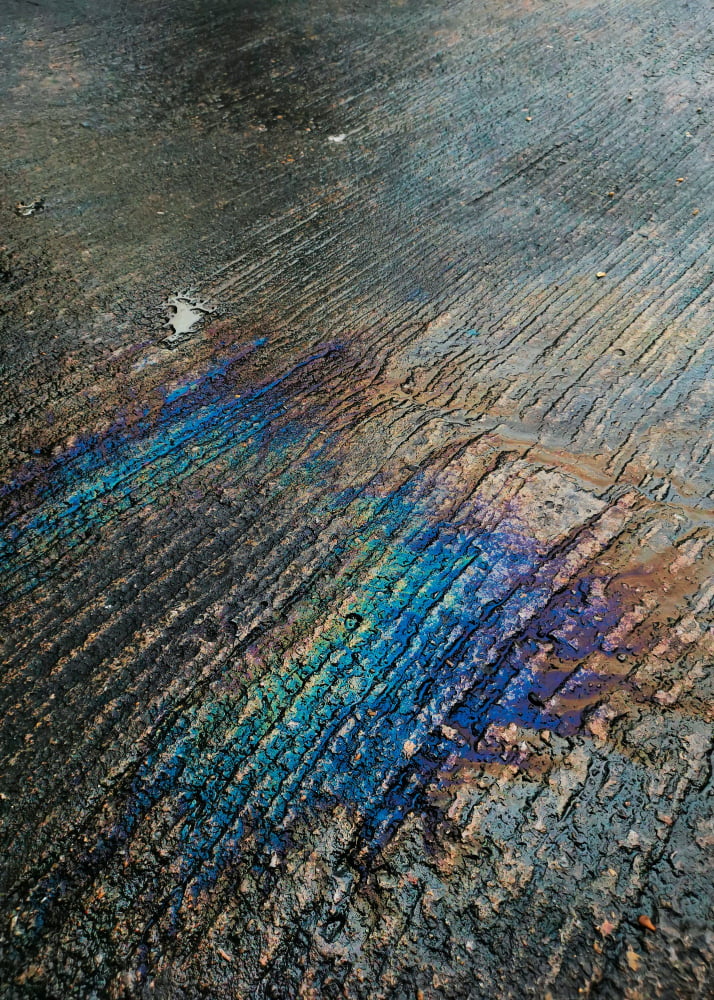
A persistent gasoline odor in your garage can be the result of a number of issues. One common cause can be a car or other motorized vehicle leaking fuel. This might be due to a faulty gas cap, damaged fuel lines, or an overflowing gas tank.
Another possible source of fuel odors can be improperly stored gasoline containers. If these are not sealed correctly, vapors can escape and fill your garage with a gasoline smell.
Additionally, spilled gasoline, especially on porous surfaces, can linger and cause a constant gas odor.
Potential Sources of Garage Gas Odors
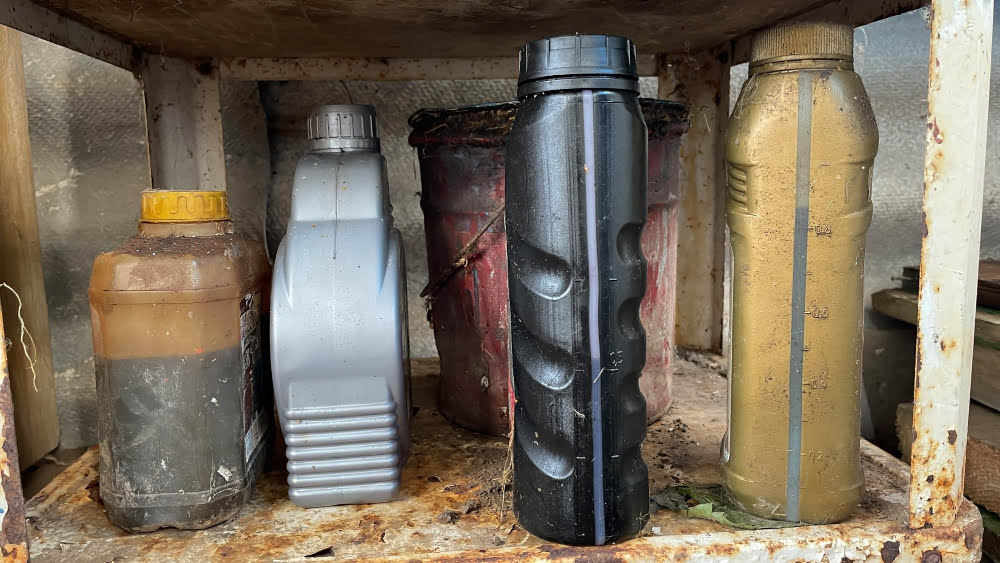
The most common culprit is the improper storage of gas cans. Even the smallest crack in the cap can contribute to a noticeable and persistent odor.
Other factors might include a gas-powered vehicle or tools being stored. These can leak small amounts of gas, particularly when they’re defective.
Drips and spills from refilling lawn mowers, snow blowers, or any other machines add up over time, infiltrating the porous concrete floor.
Lastly, consider if your garage is situated near the home’s gas meter or gas line entry points — a faulty connection could be the source.
Correct Storage of Gas Containers to Avoid Spillage and Odors
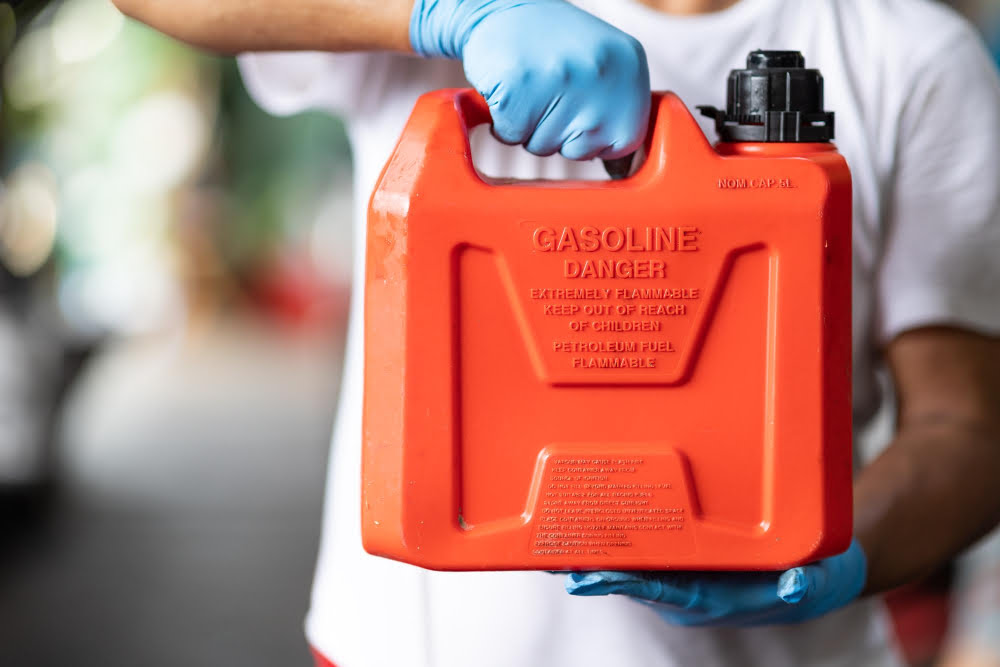
Safety caps and nozzles should be firmly attached to gasoline containers, ensuring no room exists for spills or seepage. Not only does this prevent accidental spillage, but it also inhibits potentially harmful vapours from escaping.
Always place containers in a vertical position. This orientation maintains the integrity of the cap and nozzle, reducing the likelihood of gas leakages. Additionally, it prevents the possible compromise of the container’s structural integrity due to stress on its sides from a horizontal position.
Containers should be stowed on a solid, flat surface, away from work areas and walkways. This step minimizes the risk of accidental knocking over of the container.
Opt for gasoline containers designed with flame arresters. This equipment helps prevent the ignition of vapours outside the container, thereby enhancing safety.
Above all, never forget to return the gasoline container to its designated safe storage location immediately after use. Human error is the primary cause of accidents in residential garages!
Steps to Eliminate Gas Smell in Garage
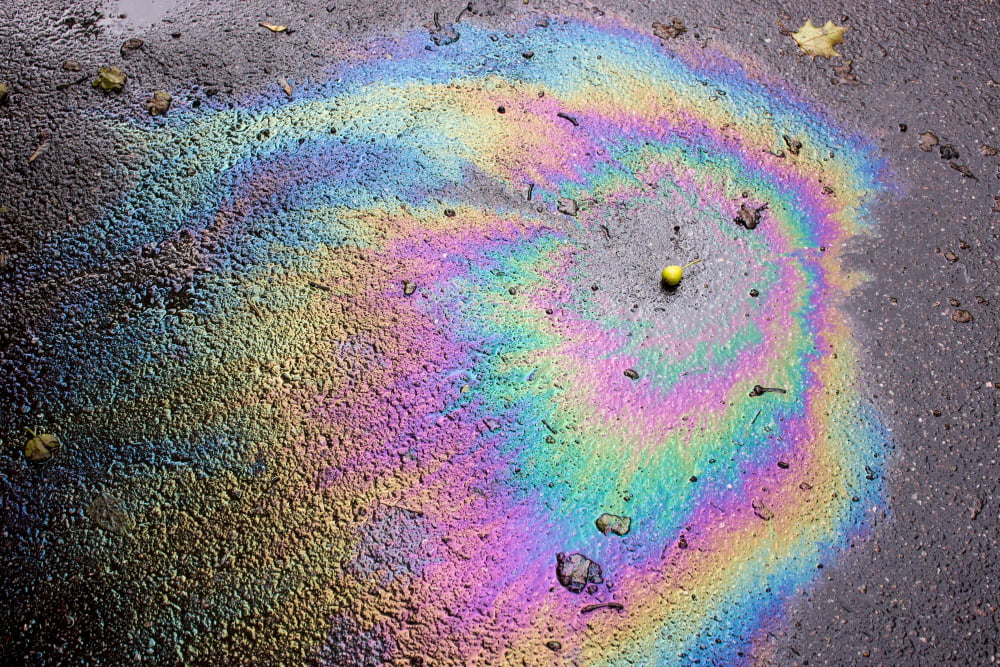
Firstly, identify the source of the odor. Look for gas spillages or leaks, which might be from gas-run equipment stored indoors or a vehicle. Clear away these sources and address any repairs immediately.
Secondly, apply an absorbent material like cat litter, which can be effective in soaking up any liquid gasoline. Allow it to sit for a few hours then sweep or vacuum it up.
Next, consider using a degreasing dish detergent on the affixed stains. Scrub the area with a scrubbing brush, then rinse with warm water. Persistence may be needed for stubborn spots.
In addition to dish detergent, baking soda serves as another reliable solution. Mix it with water to form a thick paste to apply over the stain. After leaving it on overnight, use a hose to wash it away.
Lastly, improve the garage ventilation system. Open windows and doors, use fans, or install a ventilation system to speed up the air-refreshing process.
Using Cat Litter to Absorb Gas Odors
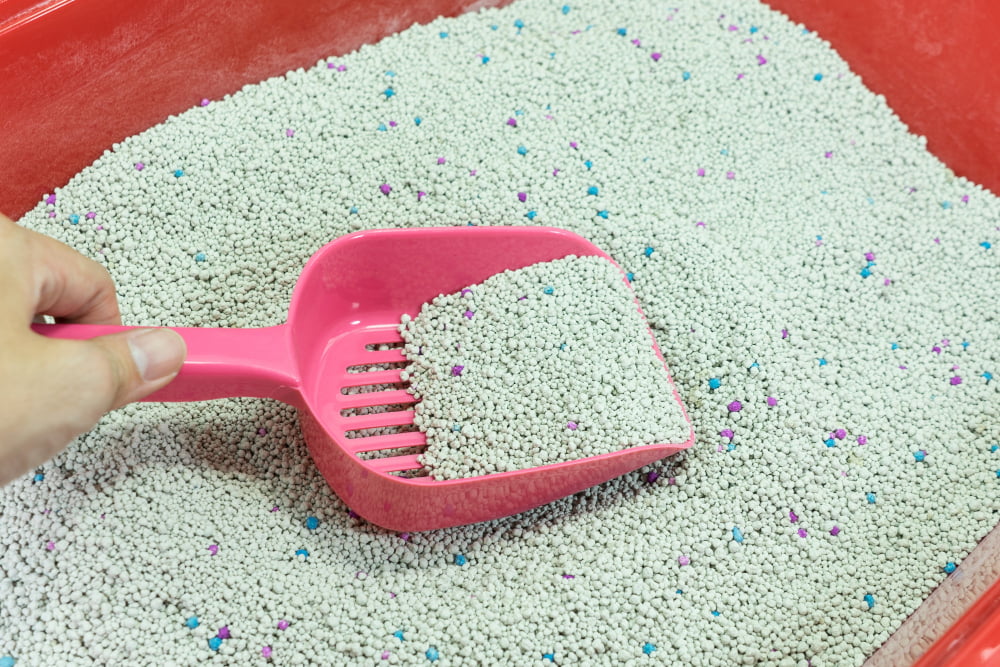
Cat litter is a great resource to have in any garage. Its absorptive qualities derive from the porous nature of the materials used, typically bentonite clay. This property makes it a highly efficient absorbent for loose gasoline droplets, stopping vapours from escaping into the air.
Here are some steps to put this to work:
- 1. Safely remove any containers of gasoline from the spill area.
- 2. Thoroughly sprinkle cat litter across the spill until the area is fully covered.
- 3. Let it sit for as long as possible – three to four hours if possible – for the litter to absorb the gas fully.
- 4. Use a broom and dustpan to sweep up the litter, now saturated with gasoline.
Remember to dispose of the used litter in a safe, approved container, and in alignment with your local regulations on hazardous waste. Always use gloves and avoid any potential fire sources when working with materials soaked in gasoline.
You may still notice the scent of gasoline after this process. If so, consider repeating the process or trying another method, such as baking soda or commercial absorbents. As always, proper ventilation is crucial to dissipating lingering fumes.
Effective Use of Dish Detergent in Gas Smell Removal
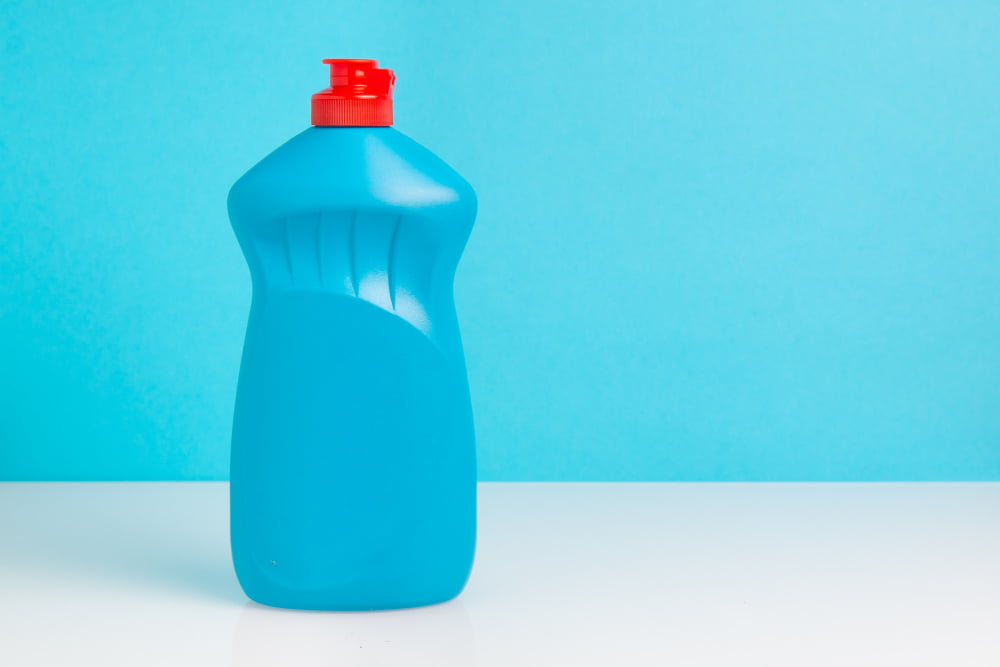
Adopting dish detergent in removing lingering gasoline odors is a simple yet effective approach. Its grease-cutting properties break down petroleum-based products is key to its effectiveness.
Here’s how to do it:
- Mix one part dish detergent with four parts hot water in a bucket. Be sure to use a detergent without additives to avoid unwanted residue.
- Generously mop the mixture over the affected area, allow it to sit for about 20 minutes to properly break down the gas compounds.
- After waiting, wash away thoroughly with warm water. It’s crucial to not leave any detergent mixture as it could cause new unpleasant smells.
- Dry the area thoroughly. Moisture can preserve odors and even attract new ones, so make sure to dry it.
For larger areas, repeat this process as needed until the smell is completely gone. Safety should remain a priority – always wear suitable protective clothing when handling any gasoline-contaminated area.
Using Baking Soda for Gas Odor Removal
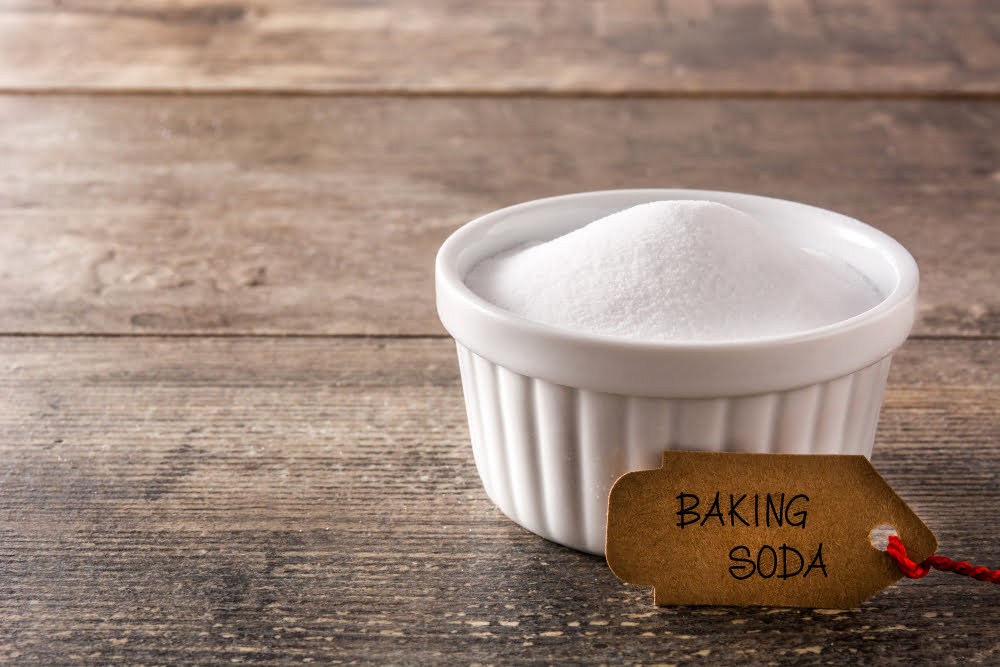
Baking soda, with its renowned odor-neutralizing abilities, can effectively combat gasoline smells. It is a straightforward method.
Start by identifying the actual spot of the spill or area of the most potent odor. Generously sprinkle baking soda over the entire area and let it settle overnight. This allows it ample time to absorb the gas smell.
Following this, sweep up the baking soda and discard it responsibly. For stubborn smells, this process can be repeated until the odor is undetectable. Remember that baking soda is also quite useful for regular prevention of odor development, especially in smaller garages where fume concentration could be higher.
Just occasionally distribute it over the garage floor and then clean it up after a few hours. This routine can keep your garage smelling fresher.
Importance of Improved Garage Ventilation for Gas Smell
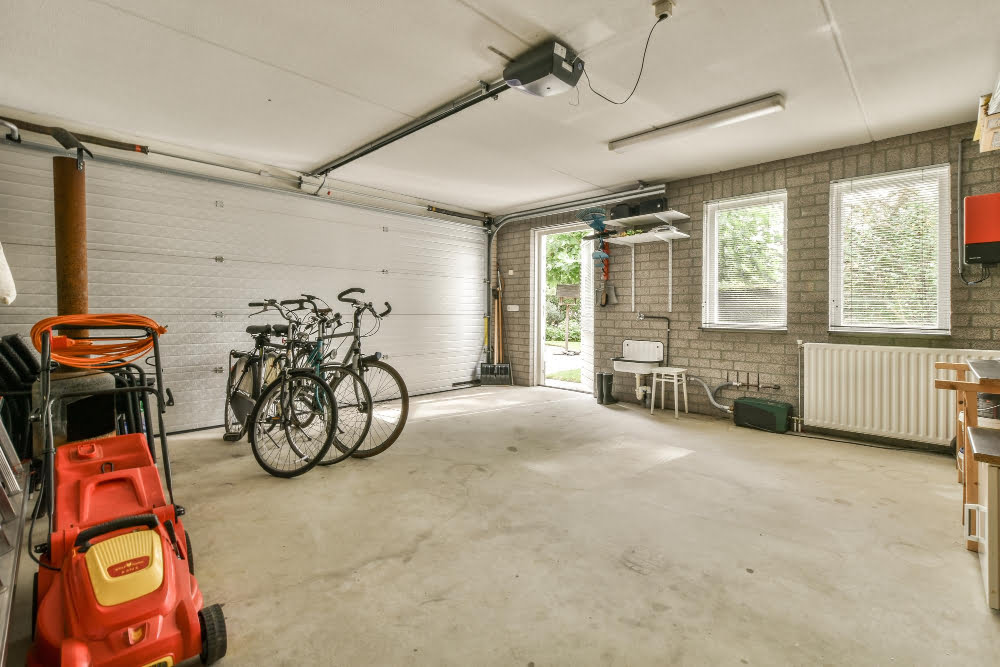
Proper ventilation plays a paramount role in controlling and eliminating gas odors. Here are a few ways to ensure your garage is well-ventilated:
1. Open the garage doors and windows: This should be your initial response whenever there’s a gas smell. Fresh air circulation will help disperse the gas quickly.
2. Install Exhaust Fans: They can draw out stale air, including gas fumes, replacing it with fresh air from outside. It is a more long-term solution to keep the garage well-aired even when closed.
3. Regular air movement: Consider using standing fans or box fans for additional air circulations. Just ensure that they are safe for use in potentially volatile environments.
4. Vents installation: If your garage doesn’t have vents, it may be time to get them installed. They provide a permanent solution to air circulation issues.
5. Air purifiers: They not only improve air quality but can also effectively remove gas odors.
Remember, these measures can significantly help in reducing the risk associated with gas odors in your garage.
FAQ
Why does my garage smell like gasoline but no leak?
The smell of gasoline in your garage without a visible leak may stem from a faulty gas cap or a malfunctioning fuel pressure regulator in your parked car.
Can gasoline fumes ignite in garage?
Yes, gasoline fumes can ignite in a garage given sufficient heat, which creates excessive pressure and releases explosive vapors.
What preventive measures can be taken to avoid gasoline odors in the garage?
To prevent gasoline odors in the garage, store gasoline in well-sealed containers and ensure adequate ventilation.
How can proper ventilation help in reducing gasoline smell in a garage?
Proper ventilation helps reduce gasoline smell in a garage by allowing fresh air to circulate, effectively diluting and eliminating the harmful and unpleasant odor of gasoline.
How can gasoline-contaminated materials be safely discarded from the garage to prevent a persistent odor?
Gasoline-contaminated materials can be safely discarded from the garage to prevent a persistent odor by disposing of them at a hazardous waste facility or event.